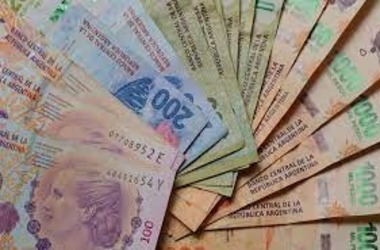 The Argentine Peso recorded a historical low of 86.3870 against the US dollar Friday, raising concerns about country’s economy outlook. Before we assess the situation, let us have a look at the recent economic data:
The Argentine Peso recorded a historical low of 86.3870 against the US dollar Friday, raising concerns about country’s economy outlook. Before we assess the situation, let us have a look at the recent economic data:
The country’s inflation rate surged 4% in December, from 3.2% in the prior month, beating market forecasts of 3.9%. While food & non-alcoholic beverages recorded 4.4% m-o-m increase, transport recorded 4.9% growth. Likewise, restaurants & hotels delivered 4.6% rise. On y-o-y basis, consumer prices rose by 36.1% in December, following a 35.8% rise in the prior month.
Argentina’s industrial production increased 4.5% y-o-y in November, following an amended 3.1% decline in the earlier month. The figure represents the sharpest growth since February 2018 as output revived with 15.3% growth in motor vehicle manufacturing and 4.3% rise in food, beverages & tobacco industry.
The country’s current account recorded a surplus of $1.16 billion in Q3 2020, following a deficit of $1.03 billion in the prior year period. While goods account surplus narrowed to $4 billion (from $4.47 billion) on y-o-y basis, services deficit fell to $0.58 billion ($1.47 billion).
However, there are serious concerns as well. Argentina’s retail sales plunged 50.1% y-o-y in October, following a 71.4% decline in the earlier month. The figure mirrors the eighth consecutive decrease in retail trade, but the mildest in seven months. Without any surprise, the Covid-19 pandemic caused 100% drop in entertainment sector and 67.8% decline in food industry.
As the country has no access to credit, the pandemic has turned the situation from bad to worse. Taking that into consideration, the country started the sovereign-debt restructuring process that resulted in testing of the collective-action clauses (CACs), which turned out to be the market standard seven years back.
Four years back, the country had successfully gained access to global credit markets after battling it out with “vulture funds” (bond holders who purchase distressed debt, retain it during the restructuring process and then litigate to receive better offers than the ones offers to restructured bondholders. With the backing of the UN General Assembly and International Capital Markets Association, CACs became the norm that automatically binds minorities to decisions made by vetted majorities.
Under these clauses, Argentina borrowed nearly $42 billion. However, three years back, market’s outlook about the bonds went about a drastic change, resulting in an extended currency crisis that ultimately made the country’s overseas currency-denominated public debt unviable. With no other option in place, the country went to the IMF, which offered a loan of $57 billion, unexpectedly. The IMF saw the overall scenario as a short-term liquidity issue.
However, it is not the case with other investors who understood that the country was facing instability in macroeconomic activity at the fundamental level, in addition to unsustainable debt. Therefore, in December 2019, the government once again went for a sovereign debt restructuring to bring debt under control and pave way for an economic rebound.
In this regard, the National Congress endorsed the government to utilize the Forex reserves held by the central bank to carry out servicing of debt, but only to a pre-determined level. The government then began discussions with the bondholders on the basis of pre-Covid-19 estimates. However, while the discussions were going on, the pandemic hit Argentina, leading to a huge and quick mobilization and also long-lasting logistic changes.
Almost the entire process of negotiation was carried out via Zoom. After months of intense negotiations, the government and creditors inked an agreement that is expected to save over $37 billion for the country over the next decade. The coupon rate was brought down to 3%, from 7% (payable in the US dollars).
Furthermore, the activation of CACs resulted in a rise in the acceptance rate of debt to 99%, from 93.5%. In fact, the stock of bonds issued on the basis of post-2014 collective-action clauses attained an acceptance rate of 100%. The entire process gave some noteworthy lesson related to debt restructuring i.e. the importance and role of IMF, need to improve the global framework for sovereign-debt restructuring despite an improved CACs, and power of private creditors, which can be overcome only if there are no issues in the political economy of a country.
The restructuring process was endorsed not only by the IMF but also by 150 scholars across the globe, including Nobel Prize winners, and G20 members. For an ordered restructuring, two laws were quickly passed by the Congress. The covid-19 pandemic is expected to force many more countries into severe debt. However, most of them do not have the resources, influence and capacity for creating an environment for balanced negotiations.
Following a contraction of roughly 12% in 2020, the country’s economy is forecast to expand 5.5% this year. Argentina, notably, ended 2020 with an inflation of 49.8%. As per the central bank’s Market Expectations Survey (REM), Argentina is anticipated to end 2021 with an accumulated inflation of 21.8%.




